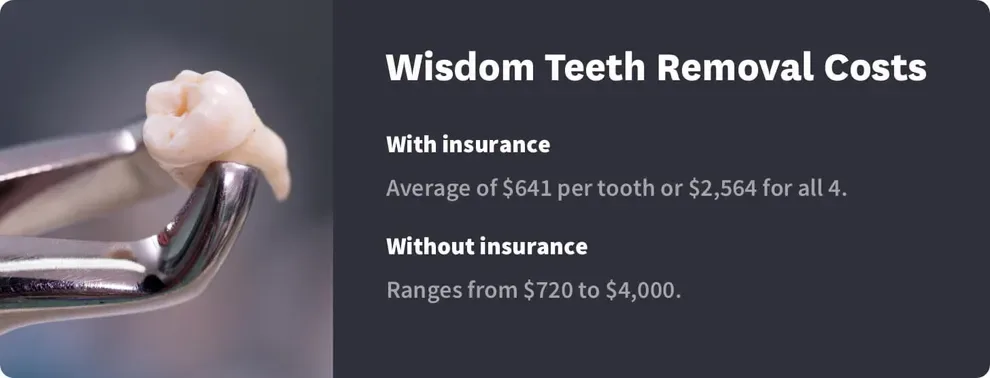Wisdom Tooth Removal Costs: With & Without Insurance.

Table of Contents
- Removal Costs
- Payment
- Wisdom Teeth Removal
- Is It Worth the Investment?
- Wisdom Tooth Removal Cost Comparisons
- Frequently Asked Questions
- How Does Dental Insurance Work?
Cost can be one of the biggest barriers to getting your wisdom teeth removed.
With insurance, wisdom tooth removal costs an average of $641 per tooth. If you need all four wisdom teeth removed, this comes to $2,564.
Without insurance, the cost of wisdom tooth removal ranges from $720 to $4,000.
If it’s deemed medically necessary, your dental insurance may cover a chunk of the bill, though you’ll still likely have some out-of-pocket costs. Insurance may not cover the cost of the anesthesia, while the cost of the rest of the surgery is usually covered.
Without insurance, you will need to pay for the whole thing out of pocket. Many oral surgeons offer payment plans that make it possible for customers to pay the bill over time.

The cost of wisdom tooth removal.
The basic cost of wisdom tooth removal varies according to the complexity of the procedure. This is often determined by whether the tooth is impacted or if it has fully erupted already.
Other factors that affect the cost include the level of anesthesia needed, the skill level of your maxillofacial surgeon, and the cost of living in your area.
These are typical costs associated with the procedure:
There is a baseline cost of at least $75 per tooth extracted, so about $300.
There is an additional cost of up to $200 per tooth, if you need more anesthesia, so you could spend as much as $800.
Nitrous oxide costs about $40 to $90.
Impacted wisdom teeth cost about $225 to $600 per tooth to remove.
Prices vary according to geographical area. Expect higher costs in places with higher costs of living. The bill can go up to $4,000 total in some places.
Dental plans typically cap what they will cover at $1,000 to $1,500, so you may get a good amount of the cost covered, as long as you have no other dental expenses in the year. This can also vary a lot by insurer. They may decide that the operation is not necessary for your overall oral health.
The average out-of-pocket cost for wisdom tooth removal, after factoring in insurance coverage, is about $641 per tooth. However, this can range from $190 to $994.
On average, people without dental insurance could pay as little as $720 for the whole procedure, up to $2,735. In some areas of the country, it may cost $3,000 to $4,000 for the whole procedure.
You may need other dental treatments to prepare for wisdom teeth removal. These could be basic procedures like:
Cleaning, which can range from $70 to $200.
X-rays, which can cost $20 to $250.
General dental exam, which can cost $50 to $150.
Other factors that can influence the cost of your wisdom tooth removal include:
Your overall health and tolerance to medications.
Whether your wisdom teeth have grown in fully. Adults in their 30s have a slightly higher risk of problems with wisdom teeth removal than younger adults.
If you smoke or drink after the procedure. Doing so can lead to dry socket or infection, adding to your overall medical expenses.
If you need your wisdom teeth removed due to oral health risks or existing oral health problems, there is not much you can do to lower these costs. Dental insurance can certainly offset the overall bill, but you will still have to pay out of pocket for some of the bill.
Wisdom tooth removal can cost a lot depending on your current oral health, if your wisdom teeth are impacted, your age, and even where you live.
Wisdom tooth removal cost comparisons
This table can help you understand the costs associated with wisdom tooth removal, with and without insurance.
| With Insurance | Without Insurance |
Simple extraction | 50% covered | $120-$800 |
Soft tissue impaction | 50% covered | $225 to $850 |
Partial bony impaction | 50% covered | $300 to $950 |
Full bony impaction | 50% covered | $350 to $1,100 |
Dental cleaning | Nothing (typically covered) | $75 to $200 |
X-rays | Nothing (typically covered) | $100 to $200 |
Dental exam | Nothing | $50 to $100 |
This table can help you understand the cost of standard wisdom teeth removal across different regions. We used the Delta Dental cost estimator to examine the costs associated with a simple wisdom tooth extraction.
Zip Code | Location | Cost Out of Network |
10001 | New York, NY | $950-$1,450 |
94016 | San Francisco, CA | $538-$770 |
80014 | Denver, CO | $568-$655 |
85001 | Phoenix, AZ | $597-$695 |
98101 | Seattle, WA | $671-$717 |
How does dental insurance work?
Dental insurance plans can help you pay for the cost of wisdom tooth removal, but understanding the details is important.
Three categories of dental insurance exist:
Preventive: These plans cover treatments and exams that can keep your teeth healthier. Services like cleaning and x-rays fall into this category.
Basic care: These plans cover minor or moderate problems like toothaches and gum disease. If you need fillings, basic extractions, or root canals, they could be included here.
Major care: Complicated dental work, like crowns and implants, are included in these plans.
If you need a basic wisdom tooth extraction, plans that include preventive and basic care might help. However, if you have serious difficulties with your wisdom teeth, you may need plans that include major care.
Some dental insurance plans cover all three types of care, but the coverage levels can vary. In a plan like this, preventive care is covered at 100%, basic care at 80%, and major care at 50%.
You may have dental insurance through your employer. If you don’t, you could buy a plan through the Affordable Care Act (ACA). Coverage for adults is not considered an essential benefit in the ACA, meaning that health plans aren’t required to provide you with this type of care. However, you might find a plan that works for you.
High-option dental plans in the ACA have higher premiums, but lower copayments and fees due when you need services. Low-option dental plans work in reverse.
If you’re hoping to use your dental insurance to pay for wisdom tooth removal, talk with your company first. Find out how much you’ll be required to pay, and ensure that the company doesn’t need things like paperwork from your doctor before they’ll pay.
How to pay for wisdom tooth removal.
Whether you have dental insurance or not, you may need help covering all the costs of wisdom tooth removal. Here are some options to help you pay for your procedure:
Most dental offices will help you set up installment payments so you can pay the overall bill in more manageable increments.
You can find some community-based dental offices that offer sliding scale options for low-income individuals and families. You will have to fill out information about your income to qualify in most cases.
Many people use a credit card to pay for their dental care, including wisdom tooth removal.
Some dental offices work with programs that offer dental-specific loans. You may also be able to find these types of loans through your bank. Like a credit card, you pay down the loan over time, but you may be able to get a lower interest rate.
Even if you do not have dental insurance, there are many options to cover the cost of getting your wisdom teeth removed. If your dentist recommends wisdom teeth removal, it’s wise to get the procedure done sooner rather than later.
Wisdom teeth removal for oral health.
Wisdom tooth removal is one of the most common dental procedures in the United States. Most people have their wisdom teeth removed when they are older adolescents or young adults. The ideal age is between 17 and 25 years old.
Your third molars, the medical term for wisdom teeth, are not useful for modern humans. While they do not cause oral hygiene issues for everyone, they can cause issues for many people if they grow in. Wisdom teeth may:
Crowd or put pressure on your other adult teeth.
Become impacted and undermine surrounding teeth.
Cause jaw pain.
Lead to infection.
Trap food particles.
Cause plaque buildup since they are difficult to clean.
Put too much pressure on the muscles in your jaw hinge.
Worth the investment?
Impacted wisdom teeth can lead to a slew of other oral health issues. While the cost can be an impediment, ignoring the issue can trigger other oral health problems that could end up costing you more money in the end.
Researchers say wisdom teeth that don’t break through the gums (impacted wisdom teeth) often don’t cause problems. However, they can cause serious issues, including the following:
Pain
Swelling
Tooth decay
Inflamed gums
Moving teeth
Scheduling wisdom tooth removal can be scary, and some people don’t want to think about it. If your dentist thinks your wisdom teeth should come out, find out why this is the case. Learn more about how keeping your teeth could harm your health. Together, you can assess the risks and benefits and make the choice that’s right for you.
Frequently asked questions.
Extracting wisdom is expensive because it is, first and foremost, a surgical procedure. Surgeries mean extra precautions for patient care, often including the necessity for the dentist to need extra assistance. Also, in many cases the procedure is not a simple extraction. It is often performed by oral or maxillofacial surgeons, who charge more than general dentists. Because the procedure is a complex extraction, there is a need for an intravenous sedation for pain management. IVs are more costly than general anesthesia.
You have several options if you can’t afford the cost of a wisdom tooth removal. Some free dental clinics offer emergency appointments for patients with limited funds and no dental insurance. In addition, most dental offices provide payment plans and dental savings plans through third-party lenders. CareCredit financing is also an option where you make monthly payments.
